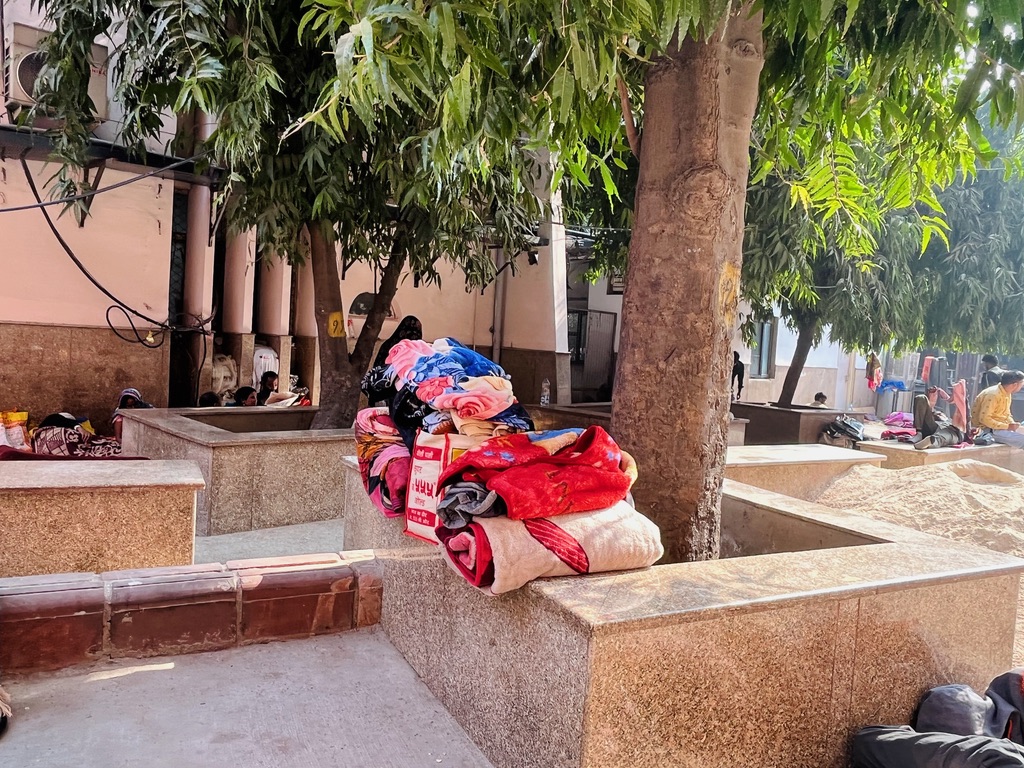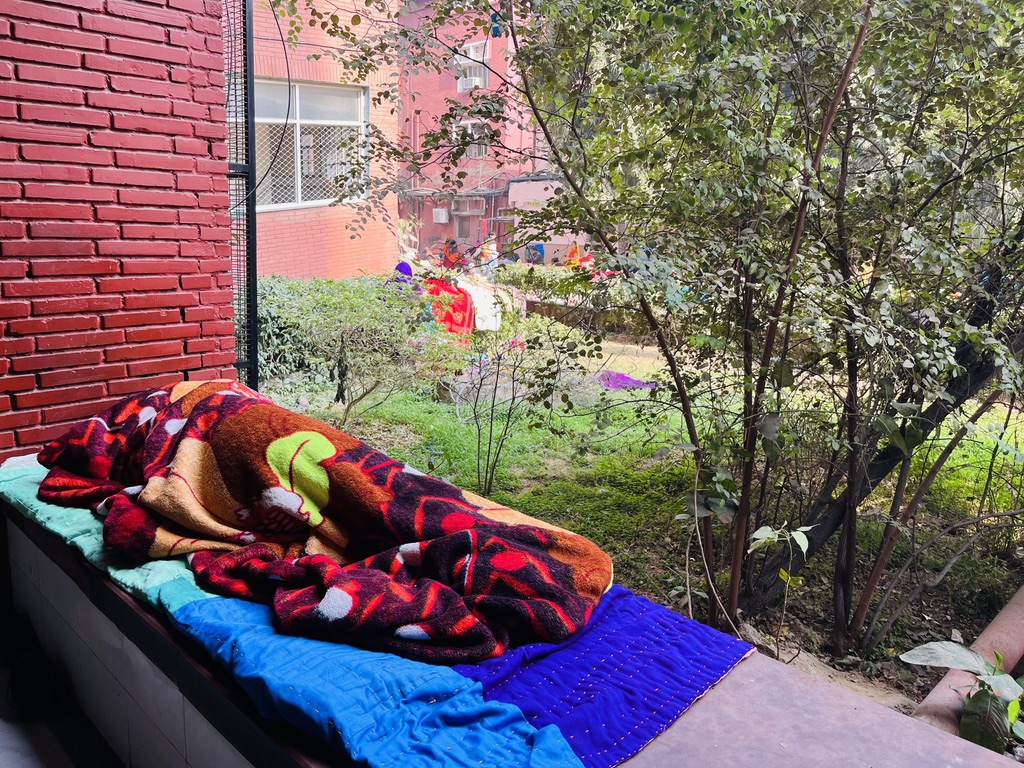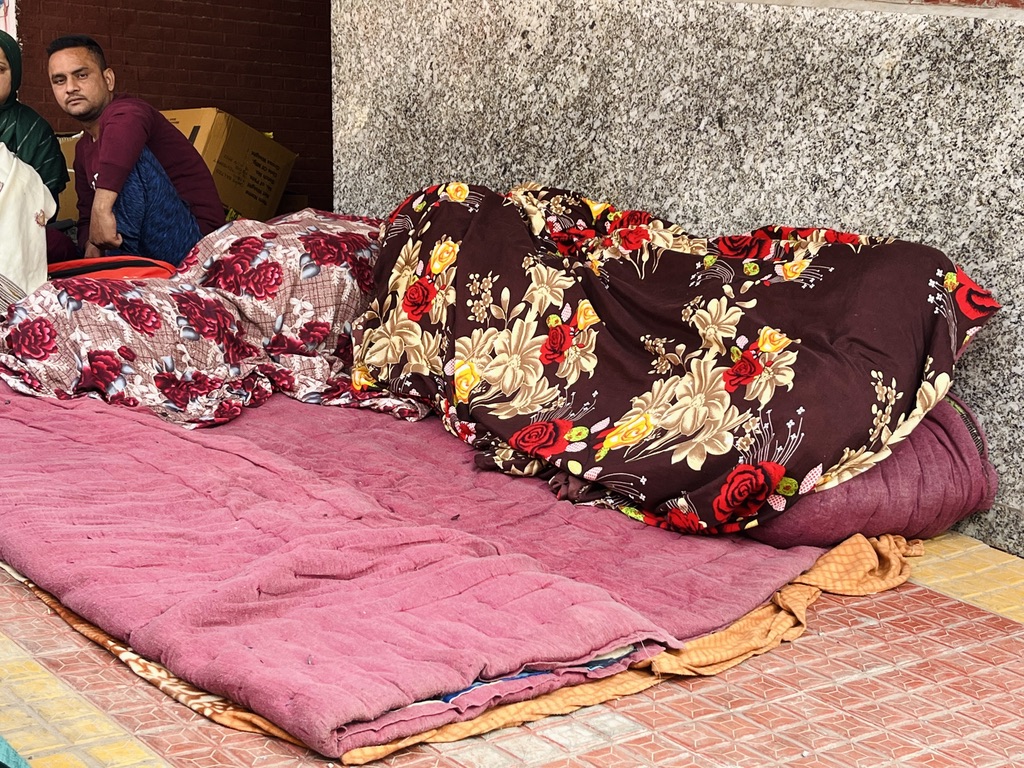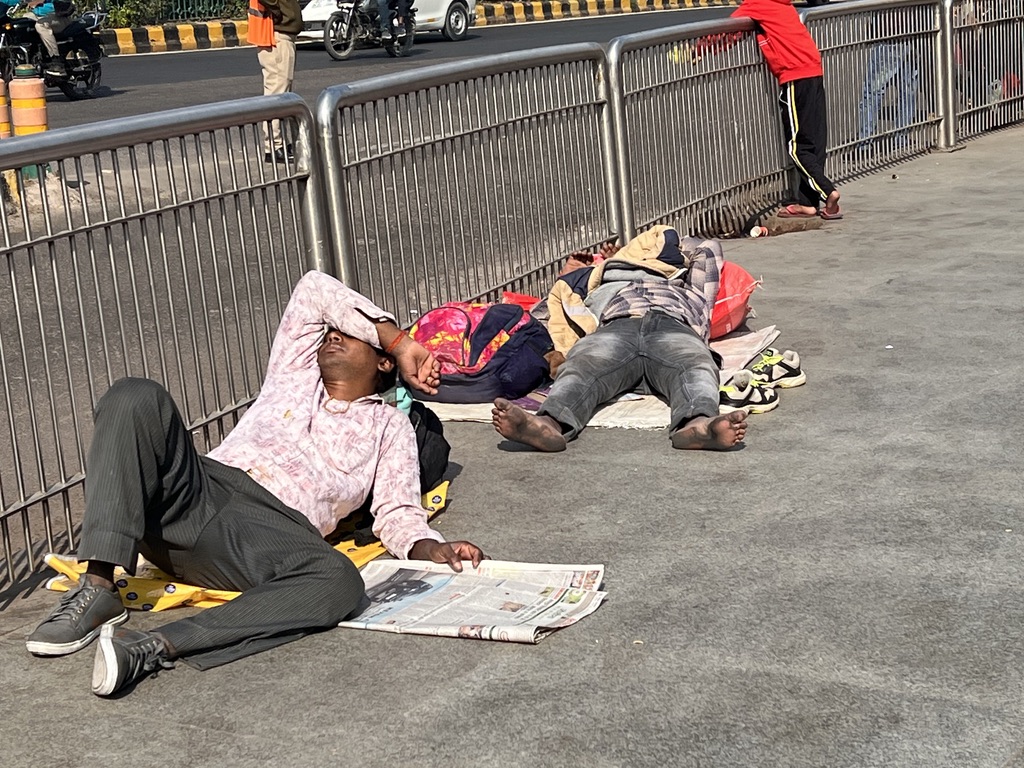मेरी बच्ची क्यों रोती है?
Why does my daughter cry?
चार साल पहले, रोहतक की एक सरकारी डिस्पेंसरी में बच्ची का जन्म हुआ था। उस समय डॉक्टरों ने ऐसा कुछ नहीं बताया कि बच्ची को कोई तकलीफ़ है या हो सकती है। अपने परिवार के साथ हम सभी गाँव लौट आए थे। गाँव लौटते ही बच्ची को प्रॉब्लम होनी शुरू हो गई थी। फिर हम लोग वापस रोहतक की उसी सरकारी डिस्पेंसरी में भागे। डॉक्टर ने देखा और बताया कि आपकी बच्ची के पेशाब और टट्टी के रास्ते में गाँठ है, दोनों की नलियाँ आपस में जुड़ी हुई हैं।
“Our little girl was born four years ago in a government dispensary in Rohtak,” recounted Manish. “At that time, the doctor did not tell us that the baby had any ailments. We returned to our village with the baby and the mother. However, soon after, the baby started having problems. We rushed back to the same government dispensary where she was born. The doctor told us that the baby’s urinary tract and colon had some blockages and were intertwined.
वहाँ के डॉक्टरों ने इसके इलाज़ के लिए सीधे एम्स जाने के लिए कहा। दूसरे ही दिन हम सारा लोग सामान लेकर वहाँ भागे। हमें कुछ पता नहीं था कि कहाँ से इलाज की शुरुआत की जाए। कपड़ों की एक गठरी के साथ हम लोग वहीं ओपीडी की पार्किंग में बैठे हुए थे। वहीं किसी से पूछकर पर्ची की लंबी लाइन में लग गए। पर्ची बनवा कर डॉक्टर के कमरे की ओर गए।
“The doctor at the dispensary referred us to AIIMS [a reputed government hospital in Delhi]. The next day we packed our things and reached Delhi. Once there, we had no idea where to begin. We sat outside the OPD [Out-patient department] parking with bundles of our children’s clothes. We asked others and got into a long queue for a ticket. After this we had to rush towards the doctor’s room.”
मनीष की पत्नी ने बात को आगे बढ़ाते हुए कहा, ‚उस समय हमें यह नहीं पता चला कि बच्ची पेशाब आने पर रोती क्यों है? बच्ची तो सिर्फ़ रोए जा रही थी। बच्ची को दूध भी चाहिए था पर मैं वह भी कहाँ से पिलाती, मेरा दूध भी उतर ही नहीं रहा था। मैंने पिछले चार दिनों से ठीक से खाना भी तो नहीं खाया था। ये यहाँ से वहाँ दौड़-धूप कर रहे थे तो इन्हें खाना लाने के लिए भी कैसे भेजती। मैं पहली बार दिल्ली आई थी, मुझे कुछ पता ही नहीं था कि कहाँ क्या मिलता है। और दोनों बच्चियाँ भी हर वक़्त मेरी गोद से चिपकी हुई थीं।‘
Manish’s wife, took over the story. “We could not fathom why the baby cried when she needed to urinate. She would keep wailing. The baby needed milk but I couldn’t feed her as I wasn’t lactating. I hadn’t eaten properly for three or four days. My husband had been running around trying to organize the treatment, so I couldn’t really ask him to get food for us as well. I was in Delhi for the first time, so I hardly knew my way around. Both the girls were in my lap and I had to care for them as well.”
उसकी बात ख़त्म होते ही मनीष बोले कि पूरा दिन लगाने के बाद, जब डॉक्टर को दिखाने का नंबर आया तो, उन्होंने एक-दो मिनट में ही देखकर कह दिया कि इसका ऑपरेशन करना होगा। यह सुनते ही हम परेशान हो गए। गाँव में फ़ोन करके अपने भाई से कुछ पैसा और ओढ़ने-बिछाने का सामान लेकर, रात की ही गाड़ी से निकलने के लिए कहा। उन्हें बताया कि एम्स में बच्ची का ऑपरेशन होना है ।
Then Manish said, “After spending the whole day, when we finally met with the doctor, he saw our baby for a minute or two and then said that the urinary track and colon were entwined and needed to be surgically separated. On my return, I told my wife everything. I then called up my brother in the village and asked him to leave immediately for Delhi with as much money as he could gather and some clothes and bedding. I told him that our baby had been admitted to the hospital and was going to have a surgery.
मनीष बोले, ‘उस वक़्त तो अपनी बच्ची को देखकर हमें रोना आ रहा था। पर हम पत्नी के सामने रो भी नहीं सकते थे। ओपीडी की पार्किंग के साथ लगी दीवार के सहारे हमने पूरी रात बिताई थी। अक्टूबर की ठंड में एक कंबल के सहारे नींद तो आनी नहीं थी। हमारे पास पैसा भी इतना नहीं था कि हम किराए पर रजाई ले लें। जब गाँव से हमारे भाई आए तब जाकर थोड़ा हौसला बढ़ा, थोड़ा पैसा भी हमारे पास आ गया था।’
“On seeing our baby, we just broke down and cried. But I couldn’t cry in front of my wife. We spent the entire night sitting against the OPD wall. It was a cold October night and we didn’t have any blankets to cover ourselves. We didn’t even have the money to hire some bedding. We spent three days like this. We got some courage when my brother finally arrived from the village. We now had some money in our pockets.
तीन दिन बाद बच्ची का पहला ऑपरेशन हुआ था। डॉक्टर ने कहा कि हम दो दिन बच्ची को अस्पताल में रखेंगे फिर छुट्टी कर देंगे। हमें लगा कि सब कुछ ठीक हो जाएगा । दो दिन तक हमारे भाई भी रहे। डॉक्टर ने छुट्टी करते समय कहा, ‘इसकी एक दो जाँच और करनी होगी जो आप अगले महीने आकर करवा लेना और उसकी रिपोर्ट हमें दिखाना।’ हमने पूछा, ‚वैसे तो सब ठीक है ना?‘ डॉक्टर ने कहा, ‚हाँ भाई, बस हमें रिपोर्ट दिखा देना।’
“Our daughter had her first surgery after three days. The doctor said, ‘We will keep her in the hospital for two days and then release her.’ We thought everything was fine and she would recover. Some of our villagers also came and lived with us for two days. When releasing our daughter, the doctor said, ‘Come and get a couple of tests done next month and then show us the reports.’ We asked, ‘Is everything alright?’ The doctor said, ‘Everything is fine. Just show us the reports once you get them.’
एक आवश्यक सूचना
Announcement
उसी रात हम लोग गाँव निकल गए थे।
“That very night, we started back for our village.
नवंबर में बच्ची को लेकर हम फिर वापस एम्स आए और जाँच करवानी शुरू की। डॉक्टर को उसकी रिपोर्ट दिखाई। उन्होंने कुछ दवाइयाँ लिखीं और हमें वापस घर भेज दिया। बच्ची दो महीने ही ठीक रही होगी कि फिर से उसे तकलीफ़ होनी शुरू हो गई। हमने यहाँ-वहाँ से फिर पैसा इकट्ठा किया और बच्ची के साथ दिल्ली के लिए रवाना हुए।
“In November, we brought our daughter back to AIIMS for the tests. When the doctors saw her reports, they prescribed some medicines and sent us back. She was well for barely two months before she started crying again as she had earlier. We somehow collected together some money, and went back to Delhi with our baby.
दिल्ली आते समय ट्रेन में रात काटना मुश्किल हो गया था। बच्ची रोए जा रही थी। जब-जब उसे दर्द होता तो वो और ज़ोर से रोने लग जाती। डिब्बे में बैठे लोग उठ-उठकर उसे देखने आ जाते। वह रो-रोकर थक जाती तो अपने आप चुप हो जाती थी।
“On our way to Delhi, we had a difficult train ride. Our daughter cried incessantly. Whenever she was in pain, she cried more loudly. The other passengers kept coming to check on her. At times she got tired of ceaselessly crying and would quieten for a while.
इस बार भी डॉक्टर ने उसे भर्ती कर लिया। कुछ चेकअप करने के बाद डॉक्टरों ने बताया, ‘जो ऑपरेशन पहले किया था वह नाकाम रहा। इंफ़ेक्शन फैल गया है। पहले हम इसका इंफ़ेक्शन ख़त्म करेंगे तब दोबारा ऑपरेशन करेंगे। इसमें दो-तीन दिन तो लग ही जाएँगे।’
“This time the doctor admitted her in the hospital. After an initial checkup, the doctor said, ‘The surgery we did earlier has failed. There is an infection. First, we will treat the infection and then we operate again. We will need at least two- three days.’
फ़ोन कॉल
Eavesdropping
मेरी समझ में कुछ नहीं आ रहा था। जो डॉक्टर कहेंगे वो तो हमें करना ही होगा। हमने फिर से बच्ची को भर्ती करा दिया। जिस दिन ऑपरेशन होना था, उस दिन डॉक्टर ने मुझे बुलाया और कहा, ‚जिस नली को हम खोलकर दवाई डाल रहे थे वो अभी बहुत नाजुक और पतली है, क्योंकि आपकी बच्ची महज़ एक साल की है।‘ ।
“I could not understand what to do, so we had to listen to the doctors. We admitted our daughter again to the hospital. On the day of the surgery, the doctor called me and said, ‘The tract through which we were giving your daughter the medication is very tender and small as she is not yet a year old.’
लेकिन वहाँ हमें पंद्रह दिनों तक रहना पड़ा था। इस अस्पताल की ऐसी कोई जगह नहीं थी, जहाँ हमने अपना बिस्तर न लगाया हो – गेट, पार्किंग, पार्क, वार्ड, लिफ़्ट के अगल-बगल – हमने हर जगह रात बिताई थी। गार्ड हटाता तो कहीं और चले जाते। बच्ची की तकलीफ़ के सामने अपनी तकलीफ़ महसूस ही नहीं हो रहा था।
We had to stay there for the next fifteen days. There wasn’t a single place in the hospital where we hadn’t laid out our bedding: the gate, parking, park, ward, in front of the elevators – we spent a night in all these places. If someone asked us to move, then we would just go somewhere else. We could barely feel our own discomfort in the face of our child’s pain.
इस बार अपने साथ पॉलीथिन में बँधा कंबल और दो बड़े थैले, जिसमें बच्चियों के भी कपड़े थे। साथ में एक छोटा-सा बैग था, जिसमें खाने-पीने का सामान भी था। हमको पहले से ही अंदाज़ा था कि इस बार भी पंद्रह से बीस दिन लग ही जाएँगे।
This time we had packed a blanket in a polythene bag, along with two bags with our daughters’ clothes. We also had a small bag with basic groceries and some food. We had estimated that this time we would need to stay in Delhi for 15- 20 days.
इस बार दवाइयों से नस को खोलकर उसके अंदर इंजेक्शन से दवाई डालनी थी। डॉक्टर ने बोल दिया था कि ऑपरेशन के बाद कोई परेशानी नहीं होगी। पर बार-बार हमें नया एक्स-रे, नई पर्ची और नई दवाइयाँ लेकर डॉक्टर से मिलना होता था। चार ऐसे चेकअप रिपोर्ट्स थीं, जिनकी रिपोर्ट सात दिन के बाद मिलनी थी। उसके बाद ऑपरेशन तय किया जाना था। तीस मिनट का ऑपरेशन था। फिर से डॉक्टर ने कहा, ‘अब सब ठीक है। छह दिन और बच्ची आईसीयू में रहेगी उसके बाद इसकी छुट्टी हो जाएगी।’
“Some medicine was used to open the tracts and then an injection was given through one. This time round, the doctor had assured us that there wouldn’t be any more trouble. But we had to meet the doctor with new x-rays, prescriptions and new medicines constantly. We had four checkup reports which we could get only after seven days. The surgery could be planned only after this. The surgery went on for thirty minutes. That day the doctor told us again, “Everything is fine. Your baby will have to stay in the Intensive Care Unit (ICU) for six days, after which she will be released from the hospital.
जब बच्ची को अस्पताल से छुट्टी मिली तो बच्ची और उसकी माँ को हमने अपने भाई के साथ तुरंत गाँव भेज दिया। मैं रोहतक में अपने गाँव वाले के यहाँ रुक गया। रिपोर्ट के बाद डॉक्टर ने दवाईयाँ लिख दी थीं और तीन महीने बाद बच्ची को ओपीडी में दिखाने को कहा।
“My wife, accompanied by my brother, took our baby back home as soon as she was released from the hospital. I stayed in Rohtak with some people who lived there from our village. Once the reports arrived, the doctors prescribed some medicines and told us to bring our daughter for a checkup at the OPD after three months.
तीन महीने के बाद हमें वापस एम्स आना था। घर में यही चर्चा हो रही थी कि कैसे जाएँगे, कौन-कौन साथ जाएगा, और कितना समय लगेगा? इस भाग-दौड़ में मेरा काम तो कब का छूट गया था। हमारे पास अब पैसा भी बचा नहीं था। इन तीन सालों में इलाज पर बहुत ज़्यादा ख़र्च हो गया था।
“After three months, we would have to go back to AIIMS. At home, the only discussion was about who would go this time, how we would go, and how much time would it take? We did not have much money saved. I had already lost my job along with all my savings. We had spent all our money on our daughter’s treatment.
आख़िरकार हमें घर में रखे पत्नी के गहने बेचने पड़े। बारह हज़ार का इंतज़ाम कर हम दिल्ली आए। टिकट बड़ी मुश्किल से मिली थी। यहाँ आकर भी हम बहुत सोच समझ कर ख़र्च करते। बिहार से दिल्ली, फिर दिल्ली से बिहार आते-जाते हम थक चुके थे। इलाज़ में बहुत समय और पैसा लग गया था। भगवान से हम यही कहते कि बस हमारी बच्ची ठीक हो जाए।
“Finally, we had to sell my wife’s jewelry and managed to get twelve thousand for our trip to Delhi. Getting the ticket was an added ordeal. Once in Delhi, we spent our money very carefully. We were exhausted with travelling back and forth between Bihar and Delhi. The treatment had wiped out both money and time. Our only prayer to God was that our baby should have a complete recovery.
इस बार डॉक्टर ने कहा , ‘अब सब नार्मल है, छह महीने के बाद आना।’
“This time round the doctor said, ‘Everything is normal. Come again after six months for a follow up.’
आज भी गाँव में जब कभी बच्ची के इलाज़ के बारे में कोई पूछता है तो ये लगता कि बताएँ भी तो क्या बताएँ! हमें तो ख़ुद नहीं मालूम।
“Even today when people in our village ask us about our daughter’s treatment, we wonder how to respond. We are still trying to comprehend what happened.”




